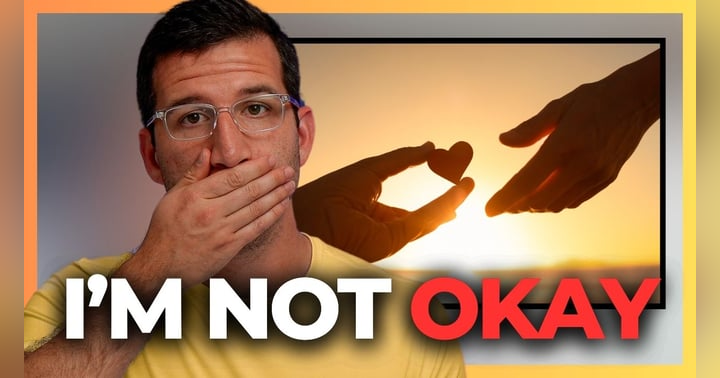How to Make Friends When You Move to a New City

Moving to a new city can be both thrilling and overwhelming. While the excitement of exploring new places and opportunities is undeniable, one of the biggest challenges is rebuilding your social circle from scratch. Whether you're relocating for a new job, school, or a fresh start, it's natural to feel uncertain about how to make friends and find your community.
In this guide, I’ll walk you through a four-step process, along with a bonus tip, to help you create lasting friendships and make your new city feel like home. If you'd like, I have a video all about this guide that you can find here.
1. Understand the Reality of Loneliness
When you move to a new city, it's common to experience loneliness—what researchers call reactive loneliness. This type of loneliness happens when major life transitions, like moving to a new place, disrupt your social support system. While it’s a temporary feeling, the key is to recognize it for what it is and take proactive steps to prevent it from becoming chronic.
Dr. Vivek Murthy, the U.S. Surgeon General, has even called loneliness one of the most significant public health challenges of our time. According to his research, loneliness can negatively impact your physical and mental health, leading to problems like depression, anxiety, and cardiovascular disease.
But here’s the good news: loneliness is something we can address. By understanding its effects and taking action early, you can avoid feeling isolated in your new city and start building meaningful connections.
2. Tap Into Your Existing Network
Before you even arrive in your new city, start tapping into your current social circle. This can be as simple as making a Facebook post or sending a message to friends and acquaintances asking for connections in the area. Many people are willing to help you settle in, even if it's just by introducing you to someone they know in your new city.
This approach is based on the Matthew Principle, which essentially means "the rich get richer." In social terms, the more relationships you have, the easier it becomes to form new ones. People who are already part of your network can connect you to others, making the transition smoother and less lonely.
A practical tip: When you post about your move on social media, be specific. Mention the city you’re moving to and ask if anyone knows people in the area. You might be surprised how quickly connections form!
3. The Four Best Places to Make Friends
Now, let’s dive into the four most common and effective places to meet new friends after a move.
Work or School
If you’re starting a new job or going to school, these environments are ripe with opportunities to meet people. Studies show that work is the most common place where Americans make new friends, with over half of adults saying they’ve formed close friendships through work.
In your first six weeks, make an effort to be socially active. Attend work events, engage with colleagues during lunch, and show curiosity about others. If you’re not naturally extroverted, consider acting like one for a short period. Research suggests that even introverts can gain the benefits of social interaction by stepping out of their comfort zone temporarily.
For students, school is often the biggest source of friendships. Join study groups, clubs, or any extracurricular activities where you can meet peers. The key is consistency—attending regular activities helps build rapport over time.
Hobbies and Interests
One of the best ways to meet people with shared values is through hobbies and interests. Whether it's joining a local sports league, taking a cooking class, or participating in a book club, doing things you enjoy in a group setting naturally leads to friendships.
Running clubs, for example, are booming right now. Not only do they offer the opportunity to meet new people, but they also provide the added benefit of a shared activity. The more often you show up, the more likely you are to form connections.
Find out what’s available in your new city before you move. Research local leagues, classes, and interest-based groups so that you can jump in right away.
Volunteering and Faith Communities
Volunteering is another excellent way to meet like-minded people, especially those who share your values. Volunteering connects you with people who care about the same causes, whether it’s animal welfare, mental health, or education. Generous people are often great friends because they’re compassionate and dedicated to helping others.
Faith communities also offer strong support networks and are often intergenerational. Churches, temples, mosques, and other spiritual communities provide structured opportunities to meet new people while engaging in shared beliefs and values.
Both volunteering and faith-based communities offer recurring opportunities for interaction, which is key to building long-term relationships.
Your Neighborhood
Don’t overlook the power of proximity—your neighborhood is full of potential friends! The first few weeks in your new home are the perfect time to introduce yourself to neighbors. Take walks, attend local events, and be friendly.
Starting conversations with neighbors can feel daunting, but it’s worth the effort. Research suggests that people who have strong neighborhood ties feel more connected and secure in their community.
Simple gestures like smiling, waving, or introducing yourself go a long way. You never know when you’ll meet someone who could become a lifelong friend.
4. Bonus Tip: Leverage Social Resources
The fifth and final key to making friends is leveraging the social resources you’ve already built through the first four steps. As you meet more people, your network will naturally expand, and you’ll begin to meet friends of friends. This creates a social flywheel effect—the more people you know, the more connections you’ll make.
This is one of the best ways to ensure you have a stable social support system. Once your network is in place, you'll have access to social resources that make you feel grounded and connected in your new city.
5. The Power of Local Social Networks
While digital communities and social media can help maintain long-distance friendships, local connections are crucial when you’re settling into a new city. Your goal should be to build a local support network. This gives you a sense of belonging and helps you navigate life in your new environment.
Once you feel settled, you can expand your network to include digital communities that align with your interests. But start locally—there’s no substitute for face-to-face interaction when it comes to making meaningful friendships.
Final Thoughts: Building Friendships and Community
Making friends in a new city takes time and effort, but it’s worth every bit of energy you put into it. By focusing on the four key areas—work/school, hobbies, volunteering/faith, and your neighborhood—you can build a strong social circle and create a real sense of community.
If you enjoyed this guide, check out my video on creating third places—spaces that foster friendships and connections in your community.
Thanks for reading, and here’s to making your new city feel like home!





